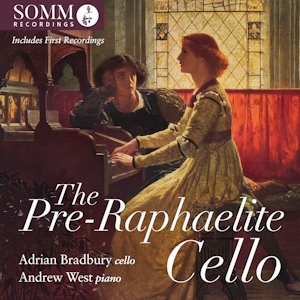
The Pre-Raphaelite Cello
Adrian Bradbury (cello)
Andrew West (piano)
rec. 2023, The Menuhin Hall, Stoke d’Abernon, UK
Somm Recordings SOMMCD0685 [73]
It was Percy Grainger who termed the Frankfurt Group ‘Pre-Raphaelite composers’, the group including Quilter, Scott, O’Neill, Gardiner, F. S. Kelly and Grainger himself. Some of their music was performed by cellist Beatrice Harrison, probably the best-known of British cellists at the time. This cello recital satellites around Frankfurt and Harrison in presenting a number of pieces, several in premiere recordings, that reflect the work of some of these important figures.
The first is Frankfurt Konservatorium’s composition teacher, Iwan Knorr who is represented by his Variationen über ein Thema von K. Klimsch. Klimsch was a mentor to Grainger and the piece consists of an unhurried, easy-going sequence of eight variations, all elegant, even debonair. There’s a minor key excursion for some expressive contrast and the expected academic fugue but the overriding spirit is playful and affectionate. Hugo Becker’s is a name well known to cellists. He gave Harrison finishing lessons and though he was to be eclipsed by Casals he remained an important player, making numerous recordings. His Op.7 is a small-scale narrative called Liebesleben that traces a love affair in six short movements of which Adrian Bradbury and Andrew West play Nos. 5 and 6, Question and Answer, both ripely romantic.
Knorr and Becker’s pieces provide a kind of compositional-teaching entrée to the programme proper, an interesting conceit devised by the late Oliver Davies, the much-missed pianist, who organised the contents of the disc. The remainder, then, is given over to transcriptions and original works by three of the Frankfurt composers, Quilter, Scott and Grainger himself. Quilter is represented by his arrangement of a fifteenth-century French chanson and a piece by Lully but also by two of his 1918 arrangements of two songs from his 1906 cycle To Julia. The cycle has remained on the periphery for British singers but in fact this month Chandos releases a Quilter Song disc in which James Gilchrist sings two from the set, including Julia’s Hair which is also performed here. The Slumber Song from Where the Rainbow Ends shows Quilter’s charm, a word invariably applied to him as a man. Dream Valley is a most persuasive arrangement and is one of the William Blake settings, which Gilchrist also sings for Chandos.
Cyril Scott is made of sterner stuff. Two of his pieces were arranged by leading cellists, Vesperale by Boris Hambourg and the Lullaby with its lulling up-and-down motion on the piano, by C Warwick Evans, of the London String Quartet. Bradbury doesn’t attempt period expressive devices here or elsewhere, abjuring portamenti and playing things straight. Pierrot amoureux was dedicated to Beatrice Harrison but first performed by Herman Sandby and Grainger back in 1904; it wasn’t published until 1912. It rises to a pitch of passion and is quite extensive and expressive in the context of the programme. The forward-looking Pastoral encodes some art deco pizzicati and note bending and ends with a lustily-voiced Reel. Still, bracing as this is, it doesn’t quite prepare one for the 1934 Ballade. At 13 minutes this is as long as Knorr’s easy-going variations but occupies a wholly different musical world. Though it’s episodic, it’s clearly sub-divided into five sections. It’s a work that traverses expressive states, rising to an emotional crisis and ending quietly. Scott’s use of the modes is instructive as he varies them from section to section. It’s hard to define what Scott was trying to do here. The dedication to ‘Madeliene’ may be a clue but there seems to be no surviving programme, if there ever was one. To me it sounds like a Lisztian tone poem and the work, modality aside, seems predicated on the Piano Sonata, though obviously on a more compressed scale. It’s the single most impressive work in the disc and is finely negotiated by Bradbury and West.
Which leaves Grainger whose Youthful Rapture, dedicated to his cellist friend Sandby, was recorded by Harrison, and the very brief Variations on Handel’s “The Harmonious Blacksmith”, which lasts 90 seconds. The envoi is that lovely piece The Sussex Mummers’ Christmas Carol played here with a confiding intimacy.
Lewis Foreman’s notes are exemplary, as ever, and the recording at the The Menuhin Hall, Stoke d’Abernon has been perfectly judged. The cover artwork is more than apposite too.
Jonathan Woolf
Buying this recording via a link below generates revenue for MWI, which helps the site remain free



Contents
Iwan Knorr (1853-1916)
Variationen über ein Thema von K. Klimsch, Op. 4 (1888)
Hugo Becker (1863-1941)
Liebesleben, Op. 7 No. 5, Frage and No. 6, Antwort (1894)
Roger Quilter (1877-1953)
L’Amour de moy (?1917)
Amadio, Act II: Bois épais (Jean-Baptiste Lully, arr. Quilter)
To Julia, Op. 8, No. 3, To Daisies and No. 5, Julia’s Hair (1906 trans 1918)
Where the Rainbow Ends, No. 11, Slumber Song (1911 trans 1912)
3 Songs of William Blake, Op. 20, No. 1, Dream Valley (1917)
Cyril Scott (1879-1970)
Vesperale, Op. 40 No. 2 arr. Boris Hambourg, 1921 (1904)
Lullaby, Op. 57 No. 2 arr. Charles Warwick Evans, 1918 (1908)
Pierrot amoureux (1912)
Pastoral and Reel (1926)
Ballade (1934)
Percy Grainger (1882-1961)
Youthful Rapture (1901)
Variations on Handel’s “The Harmonious Blacksmith” (1911)
The Sussex Mummers’ Christmas Carol (1905)

















